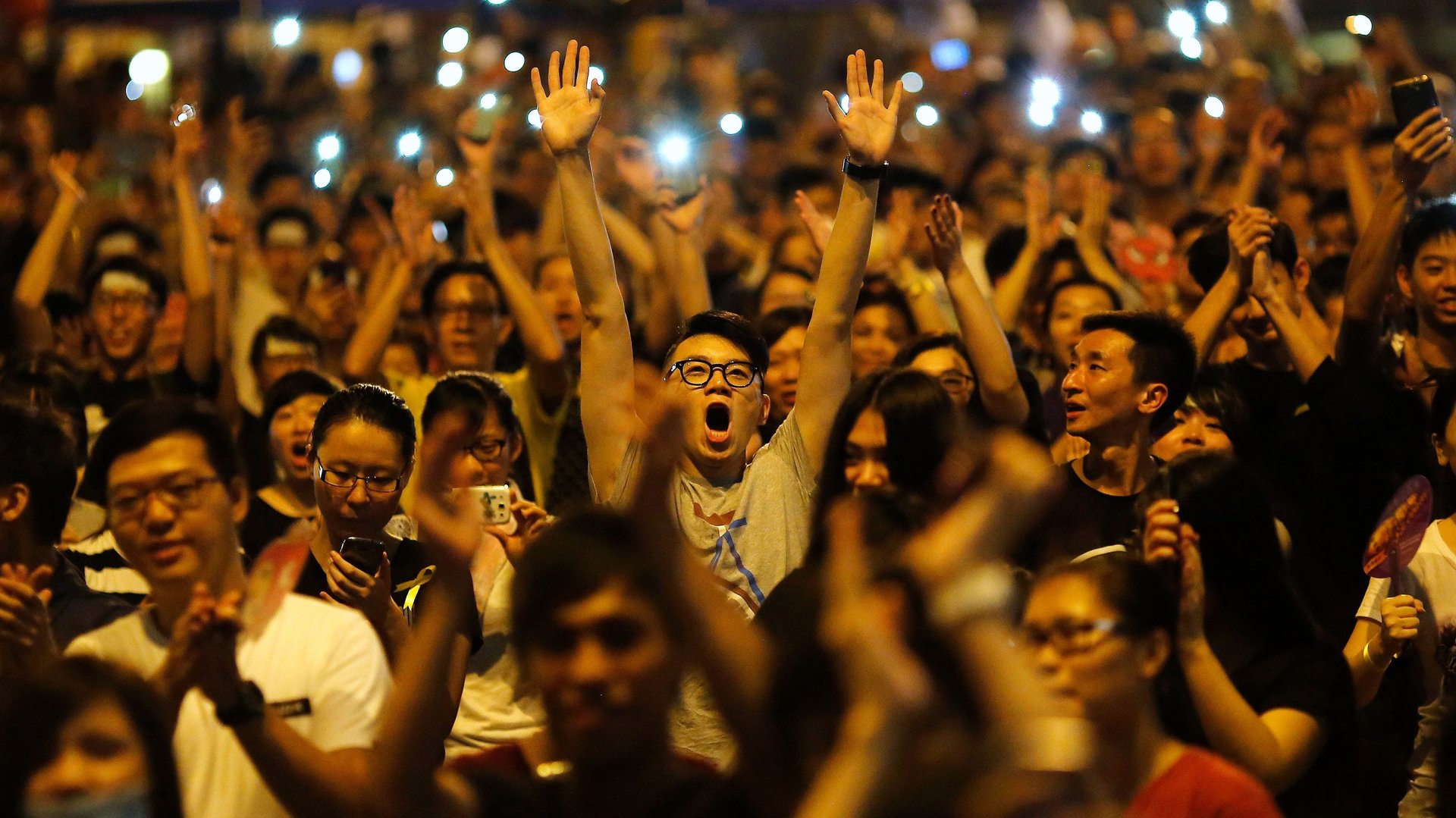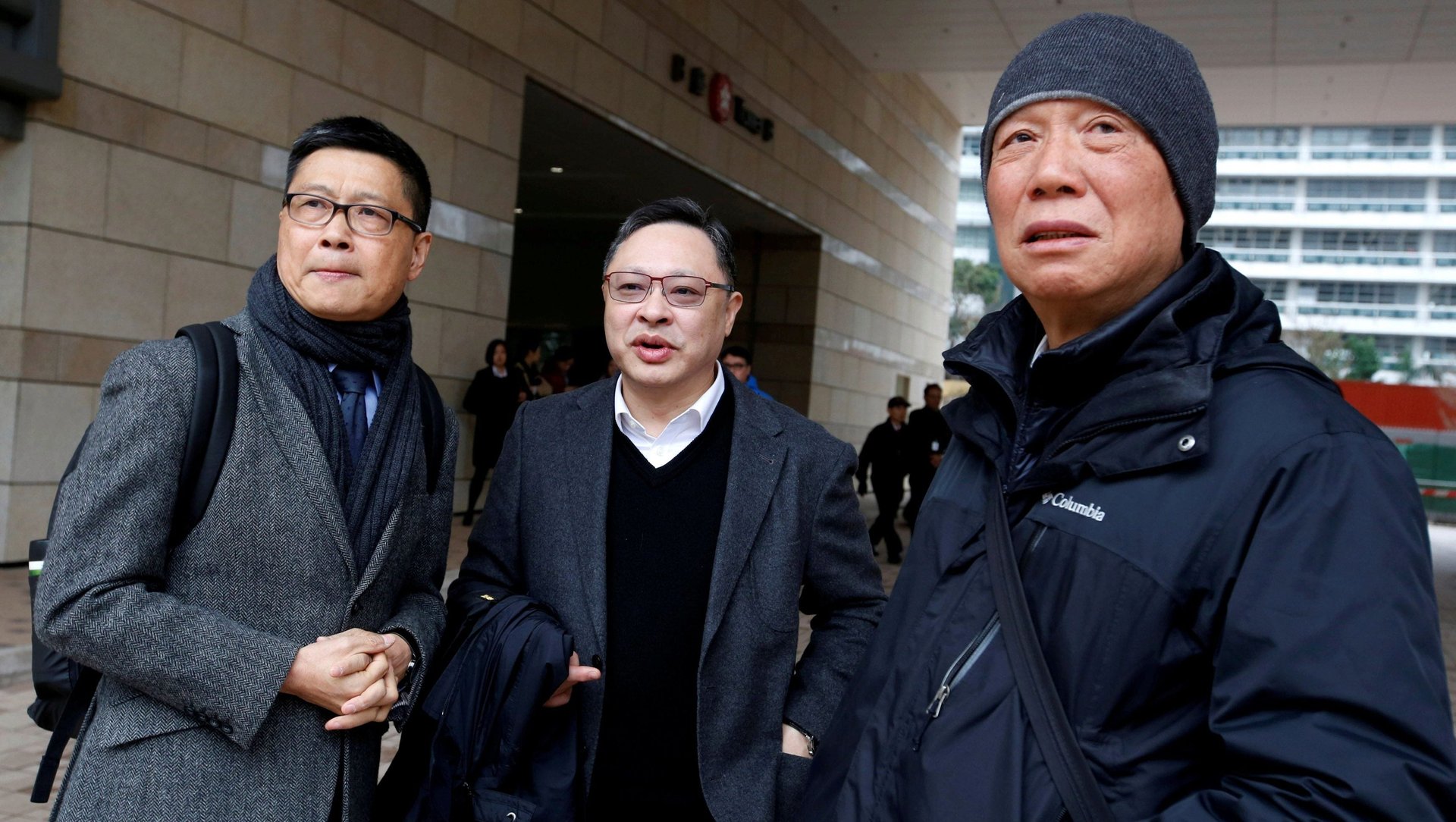Hong Kong’s trial of its “Umbrella 9” democracy protesters is beginning
Four years since the largest and longest protests since Hong Kong returned to Chinese rule, one of the city’s most politically charged trials is about to begin.


Four years since the largest and longest protests since Hong Kong returned to Chinese rule, one of the city’s most politically charged trials is about to begin.
Today (Nov. 19), the “Umbrella Nine” will be brought before judges to account for their actions during the 2014 student-led protest movement, known both as Occupy Central and the Umbrella Revolution. The group faces counts of conspiracy to commit public nuisance, incitement to commit public nuisance, and incitement to incite public nuisance, three colonial-era criminal provisions that carry a maximum sentence of six years in prison each.
The nine going on trial include the “Occupy Trio”—two professors and a reverend who founded the Occupy Central With Love and Peace movement in 2013 in hopes of achieving meaningful universal suffrage for Hong Kong in time for the city’s leadership elections in 2017. In a manifesto (Chinese and English) unveiled at a church, they called for a peaceful sit-in in Hong Kong’s Central business district if reforms weren’t made. The authorities appear to deem them responsible for the student-led street protests even though the two groups have stressed their independence from each other.
Their trial begins in a Hong Kong that has seen increasing levels of political repression and censorship since the 79-day protests, which erupted after Beijing quashed hopes for free and fair elections in the territory by proposing a severe vetting of allowed candidates. Only a tiny number of people are allowed to vote for the chief executive in the territory at present.
Several of those who emerged from the Umbrella Revolution determined to pursue a career in politics have been disqualified from taking their seats as elected politicians. In recent years, the government has prosecuted dozens of young protesters on charges related to their participation in the movement, and sentenced them to prison or community service. In some cases, the government appealed the initial sentences for key people in the movement in order to win harsher convictions.
Student activist Joshua Wong, 22, for example, considered by many to be the figurehead of the 2014 protests, was at first sentenced in 2017 to community service for unlawful assembly and incitement to assemble unlawfully, which he served. However, the government then appealed that sentence the same year, and Wong was jailed for six months.
That today’s trial is happening at all is seen as a sign of just how much more repressive Hong Kong has become. “What we do see is a greater use of the law for political aims, and the desire to put a heavy financial burden, through lengthy court proceedings, on the defendants,” said Edmund W. Cheng, assistant professor in comparative politics at the University of Hong Kong (HKU). The defendants face multiple seldom-used and nearly duplicate charges, noted Cheng.
The government could have prosecuted the group for public nuisance under Hong Kong public order laws, which would carry a lesser sentence than turning to British legal precedent—but chose not to do so.
Also, for the first time two lawmakers are going to be prosecuted, potentially further emptying the Legislative Council of its quota of democratically elected members, and skewing the body further to the government’s side.
The slow and implacable way in which the people who animated the protests of 2014 have been brought in front of the courts “continues to hurt the legitimacy of Hong Kong’s government,” said Cheng.
Here’s what you need to know about the people going on trial today.
The Occupy Trio

- Legal scholar Benny Tai Yiu-ting, 54, is an associate law professor at HKU who drafted the initial manifesto of Occupy Central to ask for greater democratic reforms towards universal suffrage in Hong Kong. Tai has been active on the political scene since his student days. (Pictured above, center)
- Sociology professor Chan Kin-man, 59, a Yale University PhD graduate. His last university lecture before the trial at the Chinese University of Hong Kong on November 14 drew more than 700 students, many of whom broke into tears as Chu said that he is “ready to go to jail” for his civil disobedience, and has asked for early retirement from the university. He reassured his audience that democracy will eventually come to Hong Kong if they don’t allow themselves be crushed. (Above, left)
- Retired pastor Reverend Chu Yiu-ming, 74, minister of Chai Wan Baptist Church, was one of the organizers of the Operation Yellow Bird, which brought some of the Tiananmen Square student protesters of 1989 to safety from China. He has always been active in the pro-democracy movement in Hong Kong. (Above, right)
Two student leaders:
- Tommy Cheung Sau-yin, 24, a student of politics and public administration at the Chinese University of Hong Kong, who has been involved in political activism since 2011 as a member of Scholarism, a group of high school students formed to oppose the introduction of the patriotic Moral and National Education curriculum in local schools. He then became the head of the student union at his university.
- Eason Chung Yiu-wah, 26, also studied politics and public administration at the Chinese University of Hong Kong, and is a former head of the student union. He took part in the failed dialogue between the Occupy student leaders and the Hong Kong government—which ended in a stalemate.
Two pro-democracy lawmakers:
- Tanya Chan, 47, a barrister and a founding member of the pro-democracy Civic Party who has been repeatedly elected to the local legislature since 2008.
- Shiu Ka-chun, 48, a philosophy student, social worker and activist, elected in 2016.
Two former politicians:
- Lee Wing-tat, 62, a former lawmaker and the third chairman of the Democratic Party, who has been particularly engaged in housing issues.
- Raphael Wong Ho-ming, 30, a social scientist and vice-chairman of the League of Social Democrats. He was condemned for contempt of court for refusing to leave the protest area in Mong Kok after it was declared illegal, and has already spent four months in jail.
The justice department has said that these cases are being prosecuted four years after the protests ended because of the amount of evidence involved, and the complexity of the cases. Human rights groups, however, have condemned the trial as politically motivated, and urged authorities to drop the cases.